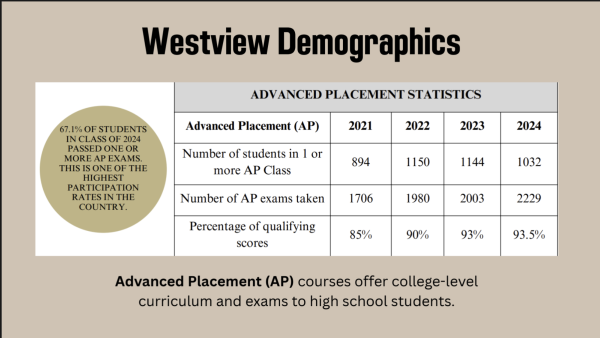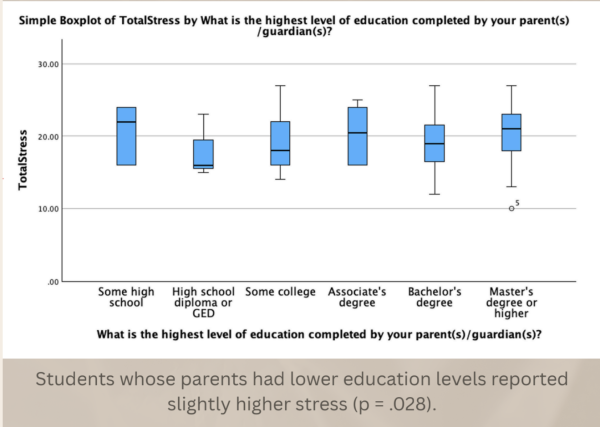Since the start of this school year, Emily Fulton and Bree Zermano, graduate students at USD working to get their master’s in school counseling, have been surveying students in AP classes across Westview for their final year capstone project on the correlation between being a high achieving student and having stress and anxiety. One of the most interesting findings from their report was that students whose parents, within the sample in the AP classes, who have not received a four-year university degree or never completed high school have higher levels of anxiety.
“There’s kind of this pressure on you as being the first generation to complete a four-year degree leading to higher levels of anxiety,” Fulton said.
The goal of the project is to measure the correlation between high-achieving students (defined as those who take one or more AP classes) and stress and anxiety at Westview. Because of the way the data was collected, the results can only be generalized to the Westview population. Fulton and Zermano chose Westview specifically because 71% of Westview students have taken at least one AP exam, making it uniquely high-achieving. One of the initial reasons the pair wanted to focus their capstone research project on this topic was to show, from what they’d seen in the counselor-student meetings that they shadow, that even academically high-achieving kids can struggle with their mental health.
“It’s also important to understand that just because [a student’s] grades are all A’s, [it] doesn’t mean that the student isn’t in need of something,” Zermano said.
The survey questions distributed to the students in the AP classes were meant to measure the students stress and anxiety levels.
“The way that we set up our survey [was] not like, ‘Hey, are you feeling anxious?’” Fulton said. “It’s broken down into indicator questions. For example, ‘I often worry about what’s going to happen in the future.’ That is something that you do when you’re feeling anxiety, whether you label it that or not.”
By the end of their process the pair collected 446 surveys, 223 of which were usable, after the data was scrubbed. The other 223 responses were deemed unusable either because the surveys were incomplete or contained improbable answers to test questions like ‘I’ve never been stressed in my entire life’ that indicate a respondent may not be reading the questions.
The pair initially hypothesized that there would be a positive correlation between the number of APs a student is taking and the amount of stress and anxiety, but the data revealed, in fact, that there was little-to-no correlation.
“There was no correlation between stress and anxiety and how many APs you’re in,” Fulton said. “Which we actually thought was interesting because we had hypothesized that it would.”
Fulton hypothesized that this is because of the general academic intensity of all subjects at Westview.
The report also found a positive correlation between time spent working on school outside of class and anxiety, and that female students have reportedly higher levels of stress than males.
Fulton and Zermano said they want their study to spark discussion about potential solutions to improving the mental health of Westview’s high-achieving students.
After a year of listening to, taking notes on, and surveying this population, they have some suggestions as well. Specifically, they think it would be helpful for different demographic groups who may be struggling in different ways, as evidenced by the results of the study, to be given targeted support.
“When designing supports here in the counseling office, maybe creating male-focused and female-focused support groups [would help] just because they may need different things,” Fulton said. “[We should] keep a closer eye on the first-gen students, potentially creating some sort of more focused group to help those students.”
Fulton and Zermano said they believe that awareness of the issue is important.
“I think that a lot of students may not even recognize that what [they’re] feeling is anxiety and stress because those can come up in psychosomatic symptoms as well, like stomach aches, headaches, lethargy,” Fulton said. “I think it’s really important to just get the word out there, how do we reach students who may not come in for emotional wellness or mental health purposes when they’re only here [Wolverine center] typically to just sign up for the next set of courses.”
The pair said they hope to leave Westview students with a better understanding of themselves, and with the message that no matter who you are, no matter what your grades look like, it’s okay to ask for help no matter what your grades look like.
“You are allowed to identify that you are struggling,” Fulton said. “And you’re allowed to seek help.”








